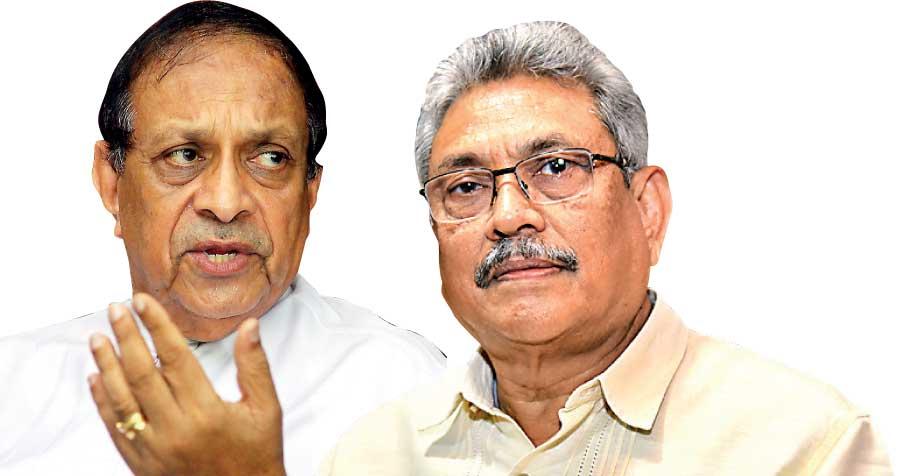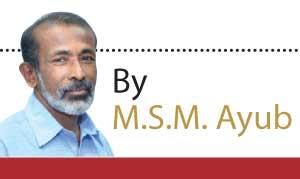Reply To:
Name - Reply Comment

Whatever the outcome of yesterday’s Working Committee meeting of the United National Party (UNP) on its presidential candidate was, the damage inflicted on the party by the feud between its leader and deputy was irreparable; particularly, efforts by the party to abolish the executive presidential mode of governance while all other parties were preparing for the forthcoming presidential poll might have created an adverse impression among the people about the UNP. 
The question of scrapping executive presidency has become hilarious now, especially following the latest efforts by the UNP and President Maithripala Sirisena to achieve it at a time when the next presidential election is fast-approaching. Last week, a special Cabinet meeting was convened to discuss the matter, but it had been decided to dump the idea as a majority of ministers opposed to take it up at the moment.
"Forgetting their bickering, Prez and PM agreed to take steps to scrap executive presidency which has become sour grapes for them"
An interesting and somewhat amusing debate followed that Cabinet meeting between the President and the Prime Minister over who mooted the idea to convene the meeting. Both leaders of the government have still been accusing each other for summoning the meeting. President Sirisena said it was at the behest of the premier that he convened the meeting while the latter claimed he merely agreed to a suggestion by the President to call the meeting to discuss abolishing executive presidency.
The reason for their disowning of the initiation of the meeting is clear. A discussion on abolishing executive presidency at a time when an election for the same has been called would obviously place them in bad light. It would be seen as an attempt to dodge the election for fear of defeat, which in fact might be the case.
Both the President and the Prime Minister have been facing serious challenges in contesting the election. President Sirisena, following last year’s local government elections at which the Sri Lanka Podujana Peramuna (SLPP) led by former President Mahinda Rajapaksa swept the electorate first, attempted to patch up with Rajapaksa and after succeeding in it, attempted to contest the forthcoming election under the SLPP banner.
"In the event of Prez contesting, the outcome is obvious and least humiliating option seems to be to stay out of the race"
His hopes were dashed when the SLPP announced former Defence Secretary Gotabaya Rajapaksa as its candidate on August 11 and now he is left with four options – to support the SLPP candidate accepting the term dictated by that party; to support the UNP candidate with conditions such as appointing him as the premier; to contest as the candidate of his own party – the Sri Lanka Freedom Party (SLFP); or to stay out of the fray.
He does not seem to be interested in supporting either the SLPP or the UNP. In the event of him contesting, the outcome is obvious and the least humiliating option seems to be to stay out of the race.
Similarly, UNP leader Ranil Wickremesinghe had either to accept, though reluctantly, the candidacy of his deputy Sajith Premadasa who has already announced it without the consent of the party but with the support of a majority of party MPs, or to leave the party to split over the same issue by announcing himself or somebody else as the candidate.
It was against this backdrop that the President and the Prime Minister were bent on to annul the race instead of running for it, as a way out of their predicament. Earlier this month, the duo forgetting their bickering agreed to take steps to scrap executive presidency forthwith which has become sour grapes for them.
They might have thought opposition leader Mahinda Rajapaksa would agree with them, given the general feeling in political circles that Rajapaksa was not happy in announcing his brother Gotabaya’s candidacy. President Sirisena had met the opposition leader but it was reported that Rajapaksa, while agreeing to the proposal in principle, had questioned the timing and bona fides of the move at this juncture.
"UNP suffering from an election phobia from the very inception of this government"
Thus, the move met an impasse and was overshadowed by other developments for a few days. The idea resurfaced in an unexpected fashion when Speaker Karu Jayasuriya announced his desire to contest the presidential election in response to “requests made by the civil society and religious leaders” as he put it.
Mr. Jayasuriya said he would contest with the sole purpose of abolishing executive presidency. Many suspected that the premier was behind the Speaker’s move. Accordingly, last week’s controversial Cabinet meeting was the third attempt, though unsuccessful, to abolish executive presidency in the run up to the presidential election.
From the very inception of this government in 2015, the UNP has been suffering from an election phobia. It dragged its feet in respect of local government elections which were scheduled to be held in 2015 and 2016, hiding a flawed delimitation process. Finally, it was only in 2018 that local government elections were held at which the UNP and the SLFP were rewarded with a humiliating defeat for their delaying tactics.
And then, the UNP presented a Bill in Parliament in September 2017 with provision to hold elections to all nine Provincial Councils on the same day, apparently with the intention of postponing polls. When the Supreme Court (SC) ruled that Provincial Council elections could not be deferred, the UNP introduced the mixed electoral system for Provincial Councils through an amendment to another Bill.
Since the amendment was brought in during the committee stage of the debate on the Bill in Parliament, it evaded the perusal by SC and got through. Finally, the report on delimitation of Provincial Council areas was sent to a committee headed by the premier but only to be not heard of. Now, the National Elections Commission Chairman says only God knows when Provincial Council elections will be held.
"Issue of abolishing executive presidency has always been used by politicians to achieve mileage"
Had the UNP agreed to hold a parliamentary election soon after the 2015 presidential poll and later local government and Provincial Council elections in time, neither the UNP nor the SLFP would have faced the current predicament.
The issue of abolishing executive presidency has always been used by politicians to achieve mileage by hoodwinking people. Except for a few, they have been blowing hot and cold over the issue. Even the least educated politician is theoretically well-versed in both justifying the presidential system as well as demonising it, depending on the political situation and affiliations. Yet, they know they are playing with the fate of the country and its people.